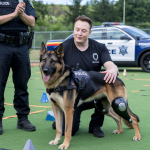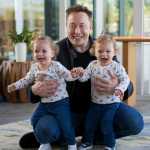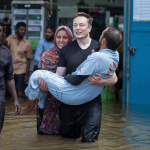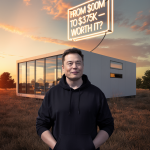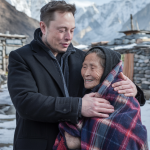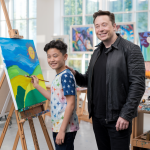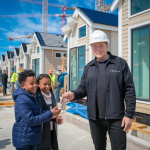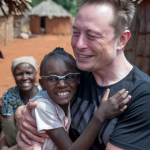Elon Musk’s Symphony of Kindness: How His Donation Struck a Chord for Inner-City Kids
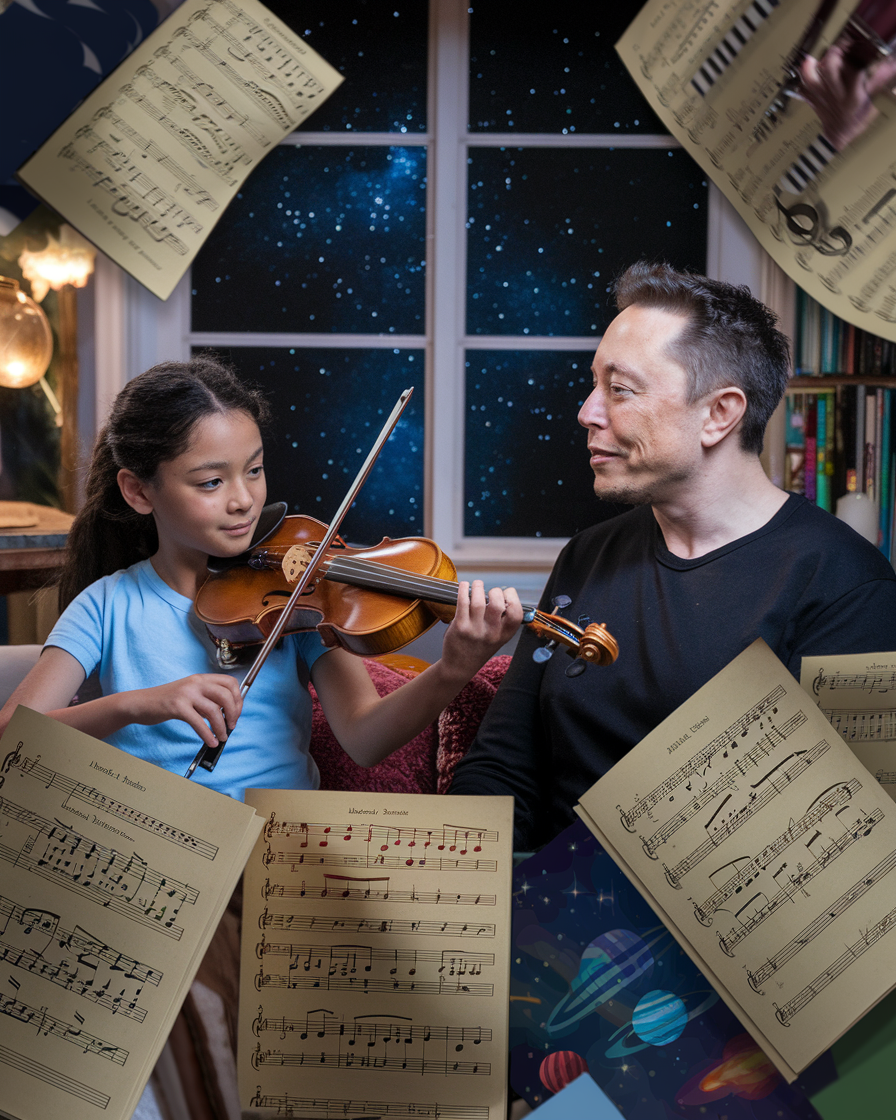
In a world where creativity can transform lives, one visionary’s generosity is hitting all the right notes. Elon Musk, known for revolutionizing space travel and electric vehicles, has turned his attention to a different kind of innovation: unlocking the musical talents of inner-city kids. His stunning donation provided instruments and music lessons to underserved youth, giving them a chance to shine. Among them is a boy whose violin solo will melt your heart—a testament to Musk’s love for creativity and the power of opportunity. This is the story of how one gift is creating a symphony of hope.
The Silent Dreams of Inner-City Youth
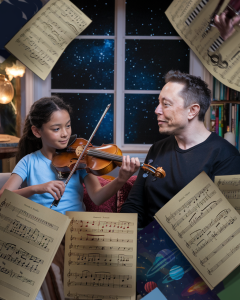
For many children in underserved urban areas, dreams of music and creativity feel out of reach. Limited school budgets, overcrowded classrooms, and a lack of resources often leave arts programs as an afterthought. In one inner-city community, a boy named Jamal (name changed for privacy) harbored a quiet passion for music. He’d hum melodies while walking home from school, tapping rhythms on his desk, and imagining what it would be like to hold a real instrument. But with no music program at his school and his family struggling to make ends meet, his talent remained untapped.
Jamal’s story reflects a broader challenge. According to the National Endowment for the Arts, only 26% of public schools in low-income areas offer robust music education programs. Yet, studies show that music can boost cognitive development, improve academic performance, and provide an emotional outlet for kids facing adversity. For children like Jamal, access to instruments and lessons isn’t just about fun—it’s about discovering their potential and building a brighter future.
This is where Elon Musk’s generosity made all the difference. His donation didn’t just fund a program; it opened a door to a world of possibility, giving kids like Jamal the tools to create, dream, and soar.
A Game-Changing Donation
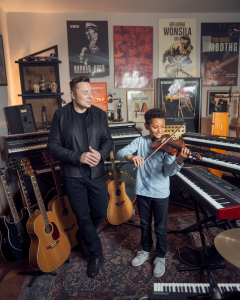
Elon Musk is no stranger to bold moves, whether it’s launching a Tesla Roadster into orbit or digging tunnels to ease traffic. But his quieter acts of philanthropy often have just as much impact. When a nonprofit dedicated to arts education for inner-city kids launched a campaign to fund music programs, Musk stepped up with a transformative donation. The funds provided instruments—violins, trumpets, drums, and more—along with professional lessons and mentorship for hundreds of children.
The impact was immediate. At Jamal’s school, a dusty storage room was transformed into a music studio, filled with gleaming instruments and eager students. Teachers, who had long advocated for arts funding, were thrilled to see their vision come to life. “This is a game-changer,” one educator said. “Thanks to Elon Musk, these kids are getting a chance to find their voice.”
For Jamal, the donation meant receiving his first violin. The moment he held it, his face lit up with wonder. Under the guidance of a dedicated instructor, he began learning the basics—how to hold the bow, draw a clear note, and read sheet music. Each lesson was a step closer to turning his hums and taps into something real, something beautiful.
The Power of Music Education
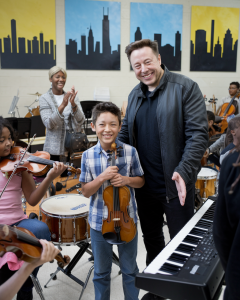
Music is more than an extracurricular activity; it’s a lifeline. Research from the University of Southern California shows that music education enhances brain development, particularly in areas tied to language, memory, and emotional regulation. For inner-city kids, who often face stress from poverty or unstable environments, music offers a safe space to express themselves and build confidence.
Jamal’s journey with the violin illustrates this perfectly. At first, his notes were shaky, his fingers clumsy. But with practice, he grew steadier, more assured. His first full song—a simple rendition of “Twinkle, Twinkle, Little Star”—earned applause from his classmates, a moment he’ll never forget. By the time he performed a solo at a school recital, his melody was so heartfelt it brought tears to the audience’s eyes. That performance wasn’t just music; it was proof of what’s possible when talent meets opportunity.
The program funded by Musk didn’t stop at instruments. It included group lessons, one-on-one coaching, and even workshops with professional musicians. These experiences exposed kids to diverse genres, from classical to jazz to hip-hop, broadening their horizons and sparking creativity. For many, it was their first chance to see themselves as artists, capable of creating something extraordinary.
Elon Musk’s Love for Creativity
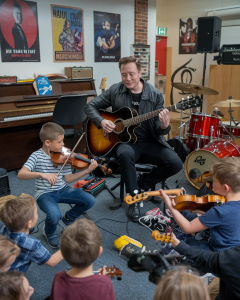
Musk’s donation reflects a deep appreciation for creativity, a thread that runs through his life and work. At SpaceX, he designs rockets that push the boundaries of engineering. At Tesla, he reimagines transportation with sleek, sustainable cars. Even his ventures like Neuralink and The Boring Company are fueled by a desire to solve problems with innovative thinking. Music, in its own way, embodies that same spirit—a blend of discipline, imagination, and expression.
While Musk is often in the spotlight for his tech achievements, his philanthropy reveals a broader vision. Posts on X frequently highlight his support for education, science, and the arts, with fans praising his commitment to empowering the next generation. By funding music programs, Musk is investing in creativity as a force for change, recognizing that a child with a violin or a drum can inspire others and shape the future.
For Jamal, Musk is more than a donor—he’s an inspiration. “I heard he builds spaceships,” Jamal said, clutching his violin. “If he believes in me, maybe I can do big things too.” That connection—between a boy’s dreams and a philanthropist’s faith—shows how far kindness can reach.
Bridging the Arts Gap
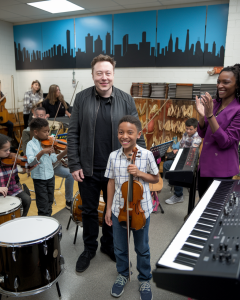
The arts gap in underserved communities is a persistent challenge. While affluent schools often boast orchestras, theater productions, and art studios, inner-city schools struggle to provide even basic supplies. This disparity limits opportunities for kids who might excel in creative fields, perpetuating cycles of inequality.
Musk’s donation is part of a growing movement to bridge this gap. Organizations like Little Kids Rock, VH1 Save The Music, and local nonprofits are working to bring arts education to every child. Their efforts are backed by research: a study by the Brookings Institution found that students with access to music programs are more likely to graduate high school and pursue higher education. Beyond academics, the arts teach resilience, collaboration, and problem-solving—skills that translate to any career.
By supporting music education, Musk is helping level the playing field. His donation ensures that kids like Jamal aren’t defined by their circumstances but by their potential. It’s a reminder that talent exists everywhere—it just needs a chance to shine.
The Ripple Effect of One Solo

Jamal’s violin solo was more than a performance; it was a spark. His classmates, inspired by his progress, began taking their lessons more seriously. Parents, who once saw music as a luxury, started advocating for arts funding. The community rallied around the program, hosting concerts and fundraisers to keep it going. What started with Musk’s donation grew into a movement, proving that one act of generosity can create waves of change.
Stories like this resonate far beyond the classroom. On X, posts about Musk’s philanthropy trend with hashtags like #MusicForKids, #InnerCityDreams, and #CreativeFuture. People share videos of young musicians, celebrate local arts programs, and call for more investment in education. Jamal’s solo, captured on a parent’s phone, even went viral, earning thousands of likes and comments praising Musk’s impact.
This ripple effect extends to the kids themselves. Music gives them a sense of purpose, a way to process emotions, and a community to belong to. For Jamal, the violin is a lifeline—a tool to express joy, sadness, and hope. As he practices, he dreams of playing in an orchestra or composing his own songs, ambitions that once felt impossible.
How You Can Support Music Education
Musk’s gift inspires us all to nurture creativity in kids. Here’s how you can make a difference:
- Donate Instruments: Many schools and nonprofits accept gently used instruments to distribute to students.
- Fund Arts Programs: Support organizations like VH1 Save The Music or local music initiatives with donations or volunteering.
- Mentor Young Artists: Offer your skills as a musician, teacher, or coach to guide kids in your community.
- Advocate for Funding: Push for policies that prioritize arts education in public schools, especially in underserved areas.
- Spread the Word: Share stories of young musicians on social media to raise awareness. Use hashtags like #MusicForKids and #Philanthropy.
Every step counts. By supporting music education, you’re helping kids discover their talents and build brighter futures.
A Melody for the Future
Today, Jamal is no longer the boy who could only dream of music. With his violin in hand and Musk’s donation behind him, he’s writing his own story—one note at a time. His solo, once a milestone, is now a starting point for bigger dreams. He practices daily, inspired by the idea that music can take him anywhere, from a school stage to a concert hall.
Elon Musk’s gift was more than instruments and lessons; it was a vote of confidence in kids like Jamal. It’s a reminder that creativity, when nurtured, can change lives and communities. As Jamal plays, his melody carries a message: every child deserves a chance to shine, and every act of kindness can compose a symphony of hope.
Let’s keep the music playing. Support a child, fund a program, or simply listen to a young artist’s song. Together, we can create a world where every kid’s talent hits the right note.

